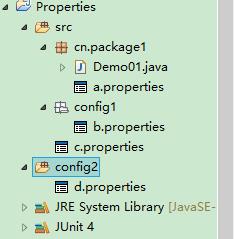Properties读取小结
Posted ---江北
tags:
篇首语:本文由小常识网(cha138.com)小编为大家整理,主要介绍了Properties读取小结相关的知识,希望对你有一定的参考价值。
一、Java程序中读取properties文件
加载的工具类:
import java.io.File; import java.io.FileOutputStream; import java.io.InputStream; import java.util.Properties; import org.apache.commons.logging.Log; import org.apache.commons.logging.LogFactory; /** * Properties工具类 * @author happyqing * @since 2014.6.6 */ public class PropertiesUtil { private static final Log log = LogFactory.getLog(PropertiesUtil.class); private static Properties env = new Properties(); static { try { //PropertiesHelper.class.getResourceAsStream("env.properties"); // /com/cici/conf/env.properties //ClassLoader.getSystemResourceAsStream("env.properties"); InputStream is = PropertiesUtil.class.getClassLoader().getResourceAsStream("env.properties"); env.load(is); is.close(); } catch (Exception e) { log.error(e); } } /** * 取属性值 * @param key * @return */ public static String getProperty(String key){ return env.getProperty(key); } /** * 设置属性值 * @param key * @param value */ public static void setProperty(String key, String value){ try{ File file = new File(PropertiesUtil.class.getClassLoader().getResource(".").getPath()+File.separator+"env.properties"); FileOutputStream outStream = new FileOutputStream(file); env.setProperty(key, value); //写入properties文件 env.store(outStream, null); } catch (Exception ex) { log.error(ex); } } public static void main(String[] args) { // TODO Auto-generated method stub System.out.println(PropertiesUtil.getProperty("txtLength")); //System.out.println(PropertiesUtil.class.getClassLoader().getResource(".").getPath()); } }
频繁的配置文件读取与操作,推荐apache commons大家庭的成员:commons-configuration
文件结构目录如图所示:

其中,config2为与src同级的sourec folder,c.properties位于src根目录,b.properties位于src/config1 folder下
a.properties位于cn.package1包下。所有结果均已成功测试,测试环境为Myeclipse2016+JDK8
其实以下也就是程序路径的区分
1.读取a.properties:
1 package cn.package1;
2
3 import java.io.IOException;
4 import java.io.InputStream;
5 import java.util.Properties;
6
7 import org.junit.Test;
8
9 public class Demo01 {
10 @Test
11 public void fun1() throws IOException{
12 InputStream in1 = Demo01.class.getClassLoader()
13 .getResourceAsStream("cn/package1/a.properties");
14 Properties props = new Properties();
15 props.load(in1);
16 String value1 = props.getProperty("name");
17 System.out.println(value1);
18 }
19 }
(输入流的处理以及关闭可以改进)
2.读取b.properties:
(重复代码已经省略!)
1 InputStream in1 = Demo01.class.getClassLoader()
2 .getResourceAsStream("config1/b.properties");
3.读取c.properties:
1 InputStream in1 = Demo01.class.getClassLoader()
2 .getResourceAsStream("c.properties");
4.读取d.properties:
InputStream in1 = Demo01.class.getClassLoader()
.getResourceAsStream("d.properties");
二、Spring项目中读取properties
总之就是,一定要加载到properties文件然后才能读取(xml文件读取或者java代码读取),至于加载的方式,可以是下面的直接使用context标签进行加载,例如使用classpath:*.properties(见下文配置文件),或者使用文末随笔中提到的使用spring的bean来进行加载!
1.配置文件中使用——使用${}取值即可
spring配置文件如何读取属性配置文件:
<!-- 加载配置属性文件 -->
<context:property-placeholder ignore-unresolvable="true" location="classpath:jeesite.properties" />
<!-- 基本属性 url、user、password -->
<property name="url" value="${jdbc.url}" />
<property name="username" value="${jdbc.username}" />
<property name="password" value="${jdbc.password}" />
springMVC中进行配置:
<!-- 加载配置属性文件 -->
<context:property-placeholder ignore-unresolvable="true" location="classpath:jeesite.properties" />
<!-- 使用Annotation自动注册Bean,只扫描@Controller -->
<context:component-scan base-package="com.thinkgem.jeesite" use-default-filters="false"><!-- base-package 如果多个,用“,”分隔 -->
<context:include-filter type="annotation" expression="org.springframework.stereotype.Controller"/>
</context:component-scan>
// 必须注意,不使用默认的过滤器!
2.Java代码中取值——使用@Value读取
/**
* 管理基础路径
*/
@Value("${adminPath}")
protected String adminPath;
/**
* 前端基础路径
*/
@Value("${frontPath}")
protected String frontPath;
/**
* 前端URL后缀
*/
@Value("${urlSuffix}")
protected String urlSuffix;
// 像这里我们可以直接把它做成一个父类,这样每个类只需要继承父类便可使用此变量,而无须重复使用每个类的局部变量
请谨记很多东西没必要写死的应该写在配置文件中,比如服务器的地址,数据库的密码等,不应该在程序中写死,而应该归配置文件管理!
spring中读取配置文件也可以参见:http://www.cnblogs.com/Gyoung/p/5507063.html
以上是关于Properties读取小结的主要内容,如果未能解决你的问题,请参考以下文章